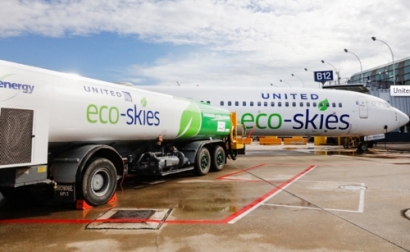
United is using the Flight for the Planet to evaluate key measures of flying as sustainably as possible using the airline's current technology, resources and fuel-saving procedures. The flight departed from United's hometown hub of Chicago O'Hare for its "eco-hub" in Los Angeles, where sustainable aviation biofuel has helped power all the airline's flights from the Southern California hub since 2016.
"The historic Flight for the Planet showcases United's philosophy of working together to find new and innovative ways to lead us into a more sustainable future," said Scott Kirby, United's president.
The Flight for the Planet further illustrated United's commitment to reduce its carbon footprint by 50 percent by 2050.
United powered the Flight for the Planet using a 30/70 blend of low-carbon, sustainable aviation fuel provided by Boston-based World Energy, and traditional jet fuel. The biofuel alone achieves a greater than 60 percent reduction in greenhouse gas emissions on a lifecycle basis compared to traditional jet fuel, and using biofuel is one of the most effective ways an airline can reduce its impact on the environment.
United recently renewed its contract with World Energy, agreeing to purchase up to 10 million gallons of cost-competitive, sustainable aviation biofuel over the next two years. United was the first airline globally to use sustainable aviation biofuel on a continuous basis and the only airline in the United States to currently do so.
United offset the remainder of the flight's emissions via the airline's new carbon offset provider, Conservation International. Conservation International now partners with United on the airline's consumer carbon offset program – Eco-Skies CarbonChoice – and together the two allies will focus on CI's mission to promote nature-based solutions to climate change.

